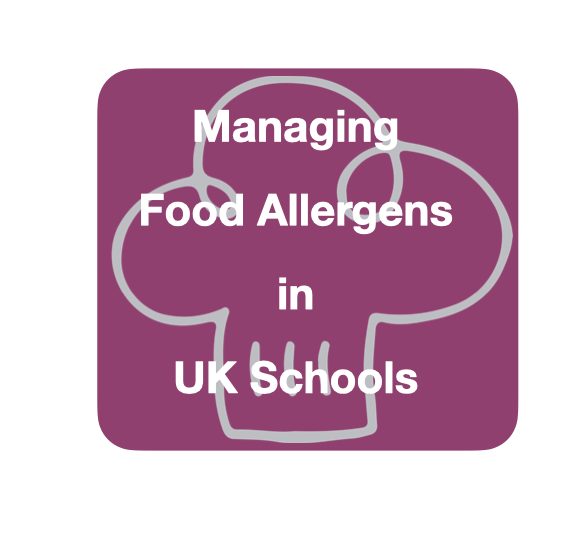Managing Food Allergens in UK Schools
- Published 22nd Jul 25
- Categories Blog

By : Kirstie Clyde – CMC Consultant & Allergen Specialist
Managing Food Allergens in UK Schools: Keeping Pupils Safe and Included
Food allergies are an increasing health concern in the UK, impacting approximately 5–8% of children. As students spend much of their time at school, it’s crucial to create a safe environment for those affected.
Whether in the dining room, classroom, or on school trips, the potential for allergen exposure is ever present and it can be an anxious time for parents/carers when they are handing over the care of their child to someone else who may not have the same experience in managing allergens — but with proper policies and heightened awareness, these risks can be successfully managed.
CMC offers essential advice on allergen management, including best practices, risk assessments, and the development of clear allergen policies.
Are We Becoming More Allergic?
The frequency of food allergy diagnosis has increased over the past 30 years, particularly in industrialised societies. Exactly how great the increase is depends on the food and where we live.
The increase in allergies is not simply the effect of society becoming more aware of them and better at diagnosing them. Many factors can play a role in determining if someone has a food allergy.
It’s not fully known why food allergies are increasing. Genetics may play a role with family members inheriting an allergy to the same or different allergen. There’s also “The Hygiene Hypothesis” that suggests as our environment has become cleaner, some children’s immune systems have become less used to fighting off triggering substances, and therefore may overreact to new proteins and create an allergic response instead.
There’s also change in diets where we are eating more foods which are not indigenous to the UK and also more ultra processed foods (UPF).
What Are Food Allergies?
A food allergy occurs when the body’s immune system reacts negatively to a protein in a particular food. Reactions can range from mild symptoms like itching and stomach pain to severe, life-threatening anaphylaxis.
According to the NHS, the number of children diagnosed with food allergies in the UK has increased significantly in recent years. The number of new cases of probable food allergy doubled in the UK between 2008 and 2018, making allergy management in schools more important than ever.
The highest prevalence was seen in children under 5 years old (4%), with a lower prevalence in school-aged children (2.4% for children aged 5 to 9-years old and 1.7% for 15 to 19-year-olds), and the lowest prevalence in adults (0.7%).
The Most Common Allergens
In the UK, food businesses — including school catering services — are required by law to declare the presence of 14 major allergens:
- Celery
- Cereals containing gluten (such as wheat, barley, and oats)
- Crustaceans (e.g., crab, prawns)
- Eggs
- Fish
- Lupin
- Milk
- Molluscs (e.g., mussels, squid)
- Mustard
- Nuts (tree nuts like almonds, hazelnuts)
- Peanuts
- Sesame seeds
- Soya
- Sulphur dioxide (used in some dried fruits and drinks)
Vegan and food allergens
Here’s something that might surprise you about vegan products. Just because a food is labelled vegan, that doesn’t mean it’s free from animal-based allergens. Traces of milk, egg, fish, crustaceans, or molluscs can still be present, especially if the product was made in a factory that handles non-vegan food. That’s why you’ll often see precautionary (‘may contain’) labelling on vegan products. And this is really important for customers with food allergies or intolerances. So the key takeaway is this: ‘Vegan’ does not mean allergen-free. Always check the label, even if the product is plant-based.
School kitchens must take these allergens in to account when planning meals, snacks, and events. In catering, managing allergens means taking steps to minimise the risk of cross-contamination and providing clear information about potential allergens, rather than completely removing them from dishes. This involves implementing procedures for storing, handling, and preparing food to prevent accidental allergen exposure.
The Importance of Allergen Awareness Training
When allergen awareness training is provided for anyone that works with or around food, the likelihood of an accidental allergic reaction or exposure to an allergen decreases significantly.
By properly understanding the risks, and how to mitigate those risks, catering teams can help to ensure their pupils and customers are safe.
There are a number of important pieces of legislation related to allergy awareness, particularly surrounding how allergens are identified and labelled, CMC’s Training Platform ensures learners find out more about relevant legislation and how they might apply it in the workplace.
Two of the most important regulations that CMC provide training on are:
- European Union Food Information for Consumers Regulation (EU Reg 1169/2011) EU Reg 1169/2011 consists of regulations that apply to a wide range of food businesses in the UK. Implemented in 2014.
- ‘Natasha’s Law’ is the latest piece of legislation affecting allergen labelling that was introduced in October 2021 to update the Food Information Regulations 2014.
The main challenges in training is the lack of time to schedule training and staff turnover. CMC’s self-paced online training offers numerous benefits, primarily revolving around flexibility and personalisation.
Learners can study at their own speed, revisit materials as needed, and tailor their learning experience to their individual needs and learning styles. This approach can lead to increased knowledge retention, reduced stress, and improved time management skills.
Legal and Safeguarding Responsibilities
Under the Children and Families Act 2014 and Equality Act 2010, schools in England have a duty to support pupils with medical conditions — including allergies. Failing to make reasonable adjustments could be considered disability discrimination.
Guidance from the Department for Education (DfE) and health authorities encourages schools to create Individual Healthcare Plans (IHPs) for students with serious allergies, outlining what to do in case of an allergic reaction and who is responsible.
Areas of Risk in Schools
Allergens can be present in many parts of school life, not just the kitchen and dining room:
- Classrooms: Food-based art projects, science experiments, and birthday treats can pose unexpected risks.
- Lunch and Break Times: Shared spaces may lead to cross-contact or unintentional exposure.
- School Trips and Clubs: Packed lunches, picnics, and unfamiliar environments can add complications.
- Celebrations and Fundraisers: Bake sales or food stalls still need to label allergens properly.
Conclusion
Managing food allergens in UK schools is not just about risk reduction — it’s about inclusion, safety, and education. With the right training, communication, and policies, schools can create an environment where all pupils can thrive, learn, and enjoy school life without fear.
Need help with your allergen compliance?
CMC can give you advice and support on all aspects of your food safety in school.
Contact us today to see how we can help you.
01254 351887
enquiries@cmcschoolfood.co.uk

